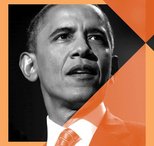Obama Explains How America Went From ‘Yes We Can’ to ‘MAGA’
“My entire politics is premised on the fact that we are these tiny organisms on this little speck floating in the middle of space,” Barack Obama told me, sitting in his office in Washington, D.C.
To be fair, I was the one who had introduced the cosmic scale, asking how proof of alien life would change his politics. But Obama, in a philosophical mood, used the question to trace his view of humanity. “The differences we have on this planet are real,” he said. “They’re profound. And they cause enormous tragedy as well as joy. But we’re just a bunch of humans with doubts and confusion. We do the best we can. And the best thing we can do is treat each other better, because we’re all we got.”
Before our interview, I’d read “A Promised Land,” the first volume of Obama’s presidential memoirs. It had left me thinking about the central paradox of Obama’s political career. He accomplished one of the most remarkable acts of political persuasion in American history, convincing the country to vote, twice, for a liberal Black man named Barack Hussein Obama during the era of the war on terror. But he left behind a country that is less persuadable, more polarized, and more divided. The Republican Party, of course, became a vessel for the Tea Party, for Sarah Palin, for Donald Trump — a direct challenge to the pluralistic, democratic politics Obama practiced. But the left, too, has struggled with the limits of Obama’s presidency, coming to embrace a more confrontational and unsparing approach to politics.
So this is a conversation with Obama about both the successes and failures of his presidency. We talk about his unusual approach to persuasion, when it’s best to leave some truths unsaid, the media dynamics that helped fuel both his and Trump’s campaigns, how to reduce educational polarization, why he believes Americans have become less politically persuadable, the mistakes he believes were made in the design of the 2009 stimulus and the Affordable Care Act, the ways in which Biden is completing the policy changes begun in the Obama administration, what humans are doing now that we will be judged for most harshly in 100 years, and more.
Mentioned in this episode
“Why Obamacare enrollees voted for Trump” by Sarah Kliff, Vox
“By 2040, two-thirds of Americans will be represented by 30 percent of the Senate” by Philip Bump, The Washington Post
“Advantage, GOP” by Laura Bronner and Nathaniel Rakich, FiveThirtyEight








